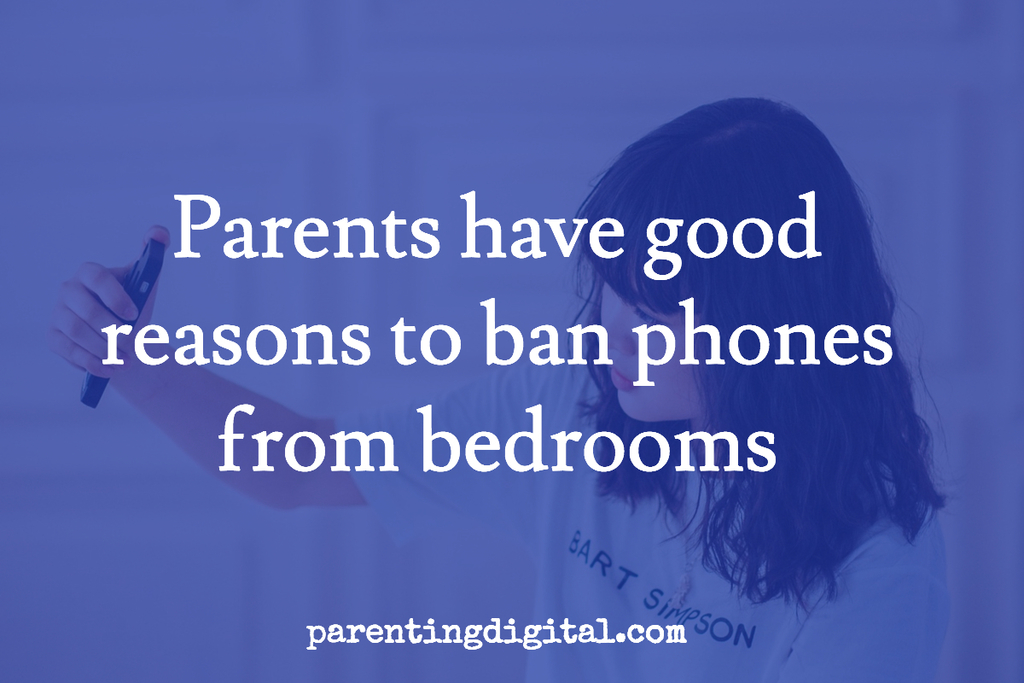As parents, we spend a huge chunk of our lives trying to protect our kids. We put bumpers on the corners of the fireplace when they start toddling. We keep a watchful eye when they are playing on the playground. We send worry-filled notes to teachers expressing concern for our child’s social or academic welfare.
Even at home, we may have internet filtering in place to keep the majority of the bad stuff away.

If they are taking a smartphone, tablet, or another device to their rooms, however, we may be missing an opportunity to teach and encourage healthy digital behaviors.
Here are four unexpected benefits when parents ban phones from the kids’ bedrooms.
Promotes better sleep
Sleep experts and recent studies tell us that screen use right before going to bed decreases the production of melatonin, the hormone that helps us sleep. For kids and adults, screens should go off at least an hour before bedtime.
Apart from the sleep-preventing “blue light” our screens give off, the very nature of social media, YouTube, Netflix, texting, and any other smartphone activity is to watch just one more. The addictive quality of all these tools and apps makes it difficult to put the phone down. Our kids are even more susceptible to fall into the habit of binging on media way past the time they should be getting to sleep.
Quiets social drama
It’s not just the light from the screens that can disrupt sleep, it’s the content coming through those media channels. Texts, posts, and images can carry the day’s drama and issues right into their bedroom. As a result, our kids never get a break from their always-on culture.
Parking their phones downstairs before going to bed also can teach a valuable, critical lesson for today’s digital kids: you can turn it off. And I’m not just referring to the phone itself.
The fear of missing out (FOMO) is very real and can drive kids (and adults) to obsessively check all our channels for the latest dirt. We give our kids a gift if we can encourage them to turn off the firehose of information that is largely unimportant and sometimes emotionally damaging. Bedtime is one of the many times to do this. The drama will still be there in the morning.
Discourages risky behavior
It is human nature to do certain things when we are alone that we wouldn’t do when others are around. We are more willing to take risks (in good and bad ways) in isolation. That’s why many of us only sing in the shower.
In the quiet of their bedroom, with the door closed, our children will naturally feel more willing to engage in behaviors that could put them in danger or expose them to harmful people or images. There is a tendency to feel safer in the security of their own bedroom. No one can get them there.
Of course, we know the opposite can be true. Those who groom and lure kids in chat rooms and social media take advantage of times when parents aren’t around. I would guess that most of the naked pictures that we are always worrying about were taken and sent from the privacy of the bedroom…and probably late at night.
Allows for deep thinking and reflection
Beyond these more well-known concerns, there is something else our kids lose when they are on screens right up until they fall asleep. Bedtime is the perfect time to think and reflect on the day. It’s a time to allow your brain to quiet itself and process what happened, discover lessons to be learned, and appreciate things for which to be thankful.
Harvard researcher Cal Newport calls this thinking “deep work,” and it is too often interrupted by the constant flow of information and media. Newport contends that, to learn and problem-solve the big things, we need concentrated chunks of time to think deeply. By removing devices from the room, we can teach our children how valuable those quiet final moments of the day can be.
You’ll notice that all the reasons above are framed in a positive way. I think this is critical if we want our kids to also see the power of putting the phone away at night. It shouldn’t just be a command from Mom and Dad, another prohibition to take away all our fun! Instead, we must frame it and deliberately explain the benefits that come to their emotional and physical health and well-being when they “turn it off” for the night.
